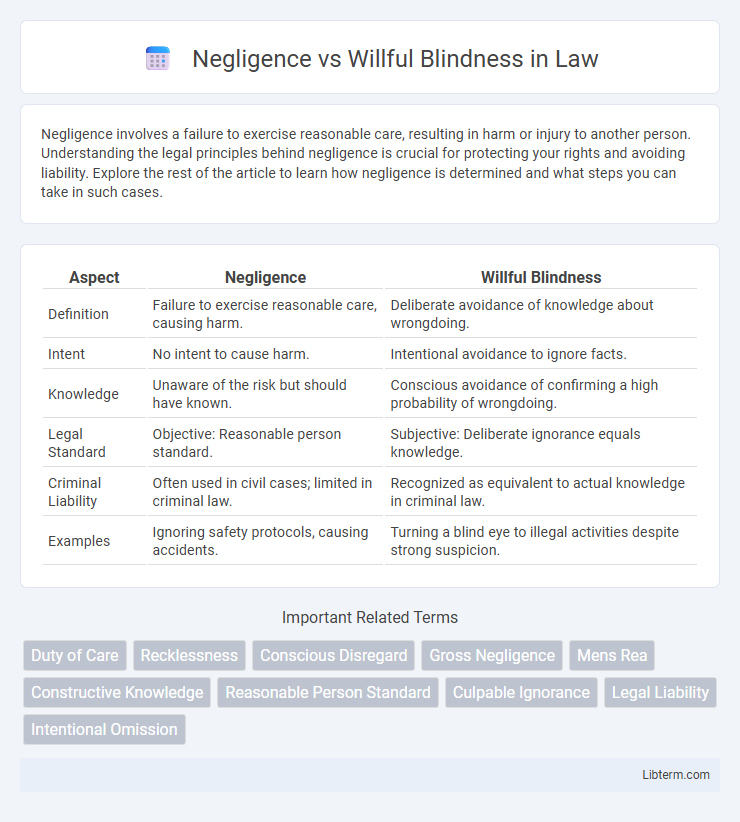Negligence involves a failure to exercise reasonable care, resulting in harm or injury to another person. Understanding the legal principles behind negligence is crucial for protecting your rights and avoiding liability. Explore the rest of the article to learn how negligence is determined and what steps you can take in such cases.
Table of Comparison
| Aspect | Negligence | Willful Blindness |
|---|---|---|
| Definition | Failure to exercise reasonable care, causing harm. | Deliberate avoidance of knowledge about wrongdoing. |
| Intent | No intent to cause harm. | Intentional avoidance to ignore facts. |
| Knowledge | Unaware of the risk but should have known. | Conscious avoidance of confirming a high probability of wrongdoing. |
| Legal Standard | Objective: Reasonable person standard. | Subjective: Deliberate ignorance equals knowledge. |
| Criminal Liability | Often used in civil cases; limited in criminal law. | Recognized as equivalent to actual knowledge in criminal law. |
| Examples | Ignoring safety protocols, causing accidents. | Turning a blind eye to illegal activities despite strong suspicion. |
Understanding Negligence: Key Concepts
Negligence involves a failure to exercise reasonable care, resulting in harm or damage, characterized by an omission or careless action that a prudent person would avoid. Key concepts include duty of care, breach of that duty, causation, and damages, which must be established for legal liability. Distinguishing negligence from willful blindness, negligence lacks conscious avoidance of knowledge, emphasizing instead an inadvertent disregard of potential risks.
Defining Willful Blindness in Law
Willful blindness in law refers to a deliberate effort to avoid knowledge of facts that would render one liable for a crime or wrongdoing, differing from negligence, which involves failing to exercise reasonable care. Courts recognize willful blindness as conscious avoidance of the truth, where a person suspects wrongdoing but chooses to ignore it to evade responsibility. This legal doctrine ensures that individuals cannot escape liability by intentionally ignoring clear warning signs or evidence of illicit activity.
Core Differences: Negligence vs Willful Blindness
Negligence involves a failure to exercise reasonable care, resulting in unintentional harm, whereas willful blindness refers to deliberately avoiding knowledge of illegal or unethical conduct to evade responsibility. The core difference lies in the mental state: negligence stems from carelessness or inattentiveness, while willful blindness is a conscious choice to ignore clear evidence. Legal systems often treat willful blindness as equivalent to actual knowledge due to its intentional nature.
Legal Standards and Burden of Proof
Negligence involves a failure to exercise reasonable care, where the legal standard requires proving that a person's actions fell below what a prudent individual would do under similar circumstances. Willful blindness occurs when an individual deliberately avoids confirming a fact, with courts often treating it as equivalent to actual knowledge for purposes of burden of proof. The burden of proof in negligence generally requires showing a breach of duty causing harm, while willful blindness shifts the burden by presuming knowledge based on conscious avoidance.
Common Examples in Everyday Life
Negligence occurs when individuals fail to exercise reasonable care, such as forgetting to lock a door or not checking expiration dates on food, leading to potential harm. Willful blindness involves deliberately avoiding knowledge of wrongdoing, like ignoring signs of product defects or refusing to verify suspicious financial transactions. Common examples in everyday life highlight how negligence results from carelessness, while willful blindness stems from intentional avoidance of the truth.
Impact on Civil and Criminal Liability
Negligence involves a failure to exercise reasonable care, leading to civil liability through damages or compensation claims, whereas willful blindness demonstrates intentional avoidance of knowledge, often resulting in harsher criminal liability due to deliberate misconduct. Courts typically impose more severe penalties for willful blindness because it implies a conscious choice to ignore wrongdoing, increasing culpability beyond mere negligence. Civil courts may also attribute punitive damages in cases involving willful blindness, reflecting greater moral blameworthiness and deterring intentional ignorance.
Case Studies: Landmark Court Decisions
Landmark court decisions such as *Global-Tech Appliances, Inc. v. SEB S.A.* illustrate the distinction between negligence and willful blindness by affirming that willful blindness involves deliberately avoiding knowledge of wrongdoing, elevating culpability beyond mere negligence. In *United States v. Jewell*, willful blindness was established when the defendant intentionally avoided confirming the presence of contraband, demonstrating conscious avoidance rather than inadvertent ignorance. These cases set critical legal precedents, emphasizing that willful blindness implies a deliberate effort to evade responsibility, which significantly impacts liability and sentencing in criminal and civil law contexts.
Prevention and Risk Management Strategies
Effective prevention and risk management strategies for negligence versus willful blindness require clear policies defining employee responsibilities and thorough training programs to raise awareness about potential risks and ethical standards. Implementing regular audits, real-time monitoring systems, and transparent reporting channels helps identify negligence early and discourages deliberate ignorance, thereby minimizing legal and financial repercussions. Cultivating a culture of accountability and continuous improvement ensures risks are managed proactively, reducing instances of both negligent acts and willful blindness in organizational operations.
Implications for Organizations and Individuals
Negligence in organizations often results in legal liabilities and reputational damage due to failure to exercise reasonable care, while willful blindness escalates consequences by implying intentional avoidance of knowledge, leading to harsher penalties. For individuals, negligence may lead to disciplinary actions or lawsuits, but willful blindness can trigger criminal charges by demonstrating deliberate ignorance of wrongdoing. Both concepts emphasize the importance of proactive compliance programs and employee training to mitigate risks and ensure ethical conduct.
Conclusion: Recognizing and Avoiding Liability
Understanding the distinction between negligence and willful blindness is crucial for minimizing legal liability, as negligence involves a failure to exercise reasonable care, while willful blindness denotes intentional avoidance of knowledge. Businesses and individuals must implement comprehensive compliance programs and conduct thorough due diligence to detect and address potential risks proactively. Recognizing these differences helps in crafting effective risk management strategies that reduce exposure to legal penalties and enhance overall accountability.
Negligence Infographic

 libterm.com
libterm.com